
(Review archived from April 4, 2018)
I definitely took the long way around on this one, but in the end the journey was highly worthwhile. Final Fantasy Tactics: War of the Lions is an enhanced PSP port of Final Fantasy Tactics (which originally appeared on PS1). Among these enhancements, the most noteworthy might be the addition of cut scenes as well as completely updated and rewritten dialogue. I always struggle with keeping my final post-game thoughts short and concise, and this seems to be doubly true with RPGs. Apologies in advance for throwing brevity out the window; let’s get right to the meat of this thing. nullPointer casts Wall of Text!
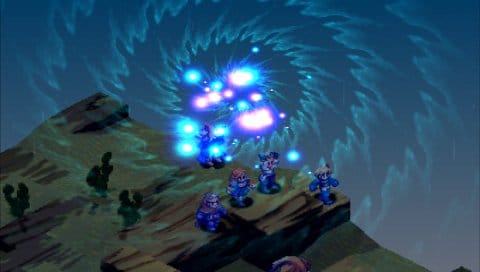
Although the story in Final Fantasy Tactics does eventually reach the requisite levels of Final Fantasy convolution, it’s probably the most ‘mature’ story line I’ve seen in a Final Fantasy game. Particularly early on, some of the more fantastical elements for which the series is known are dialed back. There are certainly plot devices present that are typical of the series; notably a rag-tag band of underdog rebel heroes fighting overwhelming odds to stop the awakening of some ancient unspeakable evil. But the notable aspect in all of this is that these familiar plot devices take place within the context of a bitter war of succession to determine the rightful heir to the throne in the kingdom of Ivalice. And in most regards, I would say that it’s this war that takes center stage. All major plot points are related to the ebb and flow of warfare in Ivalice, all characters defined by their various roles in the war. Your characters are not ‘the most important characters in the world’, and for the most part they aren’t sculpting or redirecting the tide of war either. They’re merely swept up in the momentum of the war just like nearly every other character you meet in the game. It really makes for some terrific world building, and in de-emphasizing the player characters ‘ultimate importance’ in that world, it really makes the story feel more grounded than most Final Fantasy outings. Similar praise can be given to the written dialog which is both sharp and well written. It’s certainly a welcome departure from some of the childish dialogue and amateurish localization seen in lesser JRPGs. There were a handful of in-game quotes I really wish I’d written down due to the inspired turns of phrase.
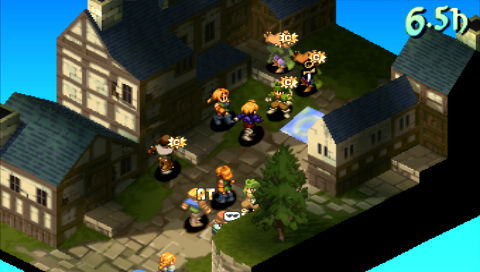
Do you like stats and systems management? FFT:WotL does. And it really wants you to like them too! This can be a double-edged sword, because while this is a game that both encourages and rewards deep exploration and experimentation within its various systems, it can also punish you unrelentingly if you fail to do so. In some ways your enjoyment of this may come down to how you feel about job systems in the context of Final Fantasy. If you’ve enjoyed this aspect in other Final Fantasy games that implemented it, you’ll likely find Final Fantasy Tactics to be a highly enjoyable experience. If you’re not a fan of Final Fantasy job systems, you might not have a good time with Final Fantasy Tactics. If you pay small heed to the assignment of jobs and learned abilities, this game will likely eat your lunch. Jobs and abilities are probably the single most important component to manage in this game, even more so than traditional experience and leveling. In the first half of the game I was more focused on leveling up my party in this ‘traditional’ sense. Higher level = higher HP, higher physical/magical power, etc. So, in traditional RPG fashion I put time into grinding and dutifully leveled my characters to high level power houses. Except that … they weren’t. The problem with this approach is that in Final Fantasy Tactics the difficulty of random encounters scales based on your experience. So I actually reached a point in which random encounters were almost too much to manage. Enemies were doing more damage per strike than I could possibly dish out in reciprocal. I actually had to de-level my characters (thanks to a few traps in the game that will allow you to do just that) in order to manage the difficulty of random encounters. I then adjusted my long-game strategy in order to place more emphasis on job levels and abilities rather than on experience levels. Once I shifted my strategy to focus on job growth and effective combinations of abilities, the game was suddenly fun and manageable again.
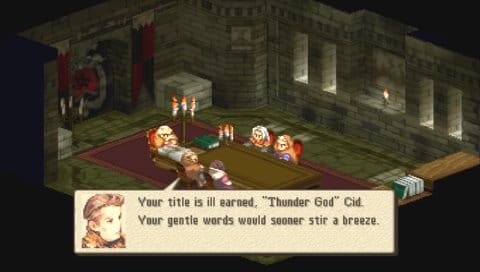
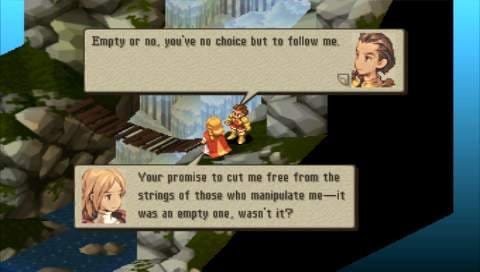
The in-game graphics are serviceable and perfectly functional. As opposed to many Final Fantasy games, there really aren’t any moments of jaw-dropping spectacle, but conversely nothing is noticeably bad either. The conversion to a handheld screen means you’re dealing with small sprites and backgrounds, but I never had a moment in which I was unsure of what I was supposed to be seeing. Long story short, FFT is more about deep and engaging gameplay than it is a show pony for graphical superiority. One aspect that I did quite enjoy was the infrequent but effective use of cut scenes. I guess you might expect quality cut scenes from Square/Final Fantasy, but stylistically these are different from anything else I’ve seen in the series. To my eye they look like a melding of anime and LotR era Ralph Bakshi overlaid on a textured surface like a medieval relief wood carving. The result is quite striking. The voice acting runs the gamut, but nothing stands out as bad, melodramatic, or amateurish. The principle voice work on the main characters of Ramza and Delita is quite well done. The music is also quite well done (as one might expect from Final Fantasy), though I don’t know that I’d rank it as highly as some of the truly legendary Final Fantasy scores.
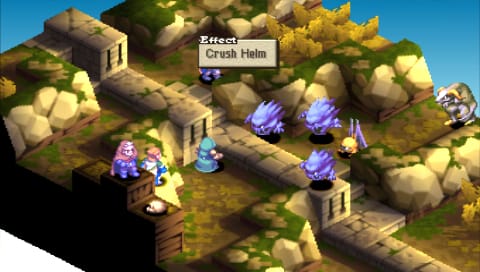
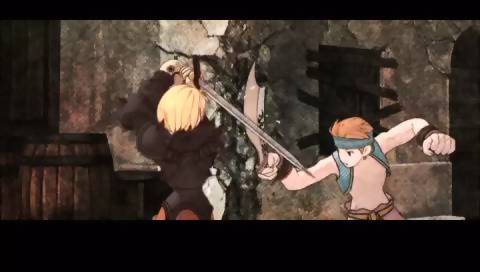
Final Fantasy Tactics is generally regarded both as a classic Final Fantasy title and as a hallmark in the SRPG genre. War of the Lions builds admirably upon that legacy and is a worthy update to the original. They made minor improvements both in the interest of modernization and providing a somewhat more robust experience, but perhaps most crucially they wisely left the core gameplay exactly as it was. If you’ve never played Final Fantasy Tactics (as was my case) or if you’re looking to play it again, War of the Lions is a great way to do that. If you have any interest in JRPGs or SRPGs and have somehow skipped over this title (which once again was my case), I’d advise you to check it out. Its reputation as a classic is well-founded.
Leave a Reply